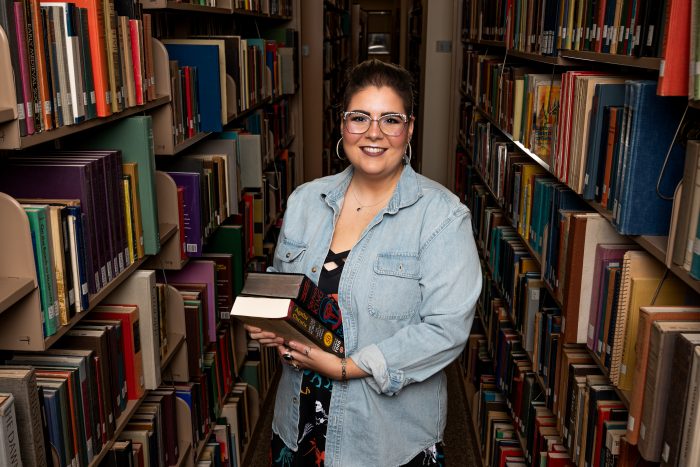
The Trial of Womanhood
What happens when women go on trial for murder?
When a woman is on trial for murder, the media and prosecution often focus less on the evidence and more on the woman and her identity; the ways she meets (or doesn’t meet) societal expectations is often used against her.
Rachel McShane studies cases of women on trial for murder. Because of societal expectations of women, she noticed that women on trial seemed to be viewed and spoken about differently than men. She calls it “The Trial of Womanhood.” She explains, “The trial of womanhood is when the media and prosecution closely examines a woman, focusing on how she fails to meet their societal expectations, and then uses these examinations against her.” For her research, she investigates news stories, court transcripts and true crime books, analyzing the words and rhetoric used to describe the women to see where and how those societal expectations show up.
Researcher

Publications and Presentations
- “Miss Monstress”: The Trial of Womanhood and Rhetorical Framing of Texas Women on Trial for Murder. Dissertation forthcoming, expected completion date May 2024.
- “Not Woman Enough”: Using Composition and Rhetoric Methodologies to Analyze Women on Trial for Murder.” Presented at Conference of College Composition and Communication, April 2024, Spokane, Washington. (upcoming)
- “It Makes Me Angry Enough to Get Up”: Joyce Ann Brown’s Wrongful Conviction and Righteous Discontent Through Community Writing. Presented a Conference on Community Writings, 2021, virtual.
- “A Trial of Womanhood: The Rhetoric of Monstrosity and Women Accused of Violence.” Presented at Southwest Populate/American Culture Association Annual Conference, 2021, virtual.
Dissertation Abstract
My dissertation is a rhetorical analysis of the cases of three Texas women who were charged with murder. I examine the rhetoric used by the media and the prosecution to describe these women and the ways they dehumanize and “other” the women on trial. I argue that the societal expectations placed on women—to be gentle, submissive and nurturers—cause a culture to reel in horror and disgust when she is accused of a violent crime like murder. What takes place is what I have termed “the trial of womanhood”—a close examination of her identity as a woman and a focus on the ways she fails to meet the societal expectations placed upon her. This rhetorical “trial” takes place both inside and outside the courtroom, in the court of public opinion, and often results in women being misrepresented and receiving harsh—and at times, fatal—sentences.
Talking Through Things
What inspired you to research this topic?
I have always been into true crime. There was a case that fascinated me for years: the Darlie Routier case. In a nutshell, Darlie Routier’s two sons were murdered by an intruder. She was injured in the attack. She told the police she saw a man, and that he ran out the garage window. One of the boys would have turned seven just a few days after the murders, so the Routier family held a birthday celebration at the boys grave. There was a private and somber vigil, but then the family opened it up to the public and the media. The media caught this short clip of Darlie singing “Happy Birthday” and spraying silly string on the boys’ headstone, and that clip was quickly circulated nationwide. Just a few days later, they arrested Darlie, and she was very quickly put on trial for murder. The prosecution didn’t have a ton of evidence to prove that she did it (what they did have was shaky and circumstantial) but they did have that video. They played it over and over and over again, and basically said “This isn’t how a good mother would grieve.” When the jury deliberated, they didn’t want to see evidence or rehear any testimony, but they did want to rewatch the Silly String video. Even though it wasn’t actual evidence, that video swayed them. They found Darlie Routier guilty, and sentenced her to death. That happened in 1996, and she’s still on death row today.
That case happened in Rowlett, Texas, just about 15 minutes from where I grew up. I was always interested in the case, because I wondered How could they use that video against her like that? I just don’t think grief is scripted, and it bothered me that the expectations of a grieving mother were used against her. I wrote a paper about it once in a class for Dr. Ashanka Kumari, and she encouraged me that it was a great topic and told me that I should really think about looking into it more deeply. Now I’m writing my entire dissertation about cases of women in the state of Texas who have gone through similar experiences as Darlie Routier.
What’s your favorite thing about your research?
I love that I get to incorporate something that interests me into my career and work. I thought for so long that my interest in true crime was just a niche hobby, and never imagined I’d be able to look at it from an academic standpoint.
What type of scholarship do you rely on?
I’m pulling scholarship from all sorts of areas! My main focus is rhetoric and composition, so I’m relying on three different “sub-areas” of rhetorical composition. The first (and biggest area) is feminist rhetoric to look at the expectations of women and the ways women are viewed and treated. The second is called “place-based rhetoric.” Basically, it’s all about considering the literal place and location a person is physically in and how that affects them. In my research, I’m thinking specifically about cases in Texas, so it’s important to consider that. Lastly, I’m also using rhet-comp scholars who have written about the power of stories and, more specifically, the power telling stories gives to incarcerated individuals.
I’m also going outside of rhet-comp and pulling from the field of criminology. Basically, I’m taking a few different fields of study and bringing them together.
Where do you see this research going from here?
I’d like to expand the area of my research. Like I said, I’m currently focusing on cases that took place in Texas, but the trial of womanhood isn’t unique to Texas. It happens all over, so I’d like to look at cases from different areas of America or even the world. I’d like to write some articles and even design a class so others can learn about this, and I definitely think I have book material!
Faculty Advisors
Outside Committee Member
Patrick W. Berry, Associate Professor of Writing and Rhetoric, Syracuse University. Author of “Doing Time Writing Lives: Refiguring Literacy and Higher Education in Prison” (2018) and “Transnational Literate Lives in Digital Times” (with Gail E. Hawisher and Cynthia Selfe, 2012)
Related Degrees
English (PHD) Rhetoric and Composition Emphasis
The Ph.D. in English is designed for students wishing to teach in community or four-year colleges and universities. It stresses both substantive knowledge of the various divisions within the field of English and an extensive introduction to the profession, including classroom teaching, tutoring and computer-assisted instruction. The degree requires that each candidate serve as a teaching assistant.
Featured photo © DedMitay / Adobe Stock



 Researcher
Researcher
